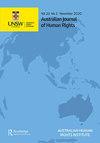在桌子、门和倾听空间:议会人权审查程序和其他人的参与
Q1 Arts and Humanities
引用次数: 0
摘要
一些学者认为,议会人权审查程序必须允许民间社会行动者参与并接受其审查。然而,对澳大利亚议会人权审查程序如何展开的审查有限。权利审查的工作在哪里进行,谁在谈判桌上占有一席之地,审查工作究竟是如何展开的?在本文中,我们通过对前任和现任国会议员、他们的工作人员和其他直接参与审查过程的人进行深入的定性访谈,探讨了这些问题。我们探讨了他们对审查过程的描述,重点是他们对委员会在哪里以及如何工作、谁在桌旁、谁发言、谁倾听的描述。借鉴Kay Lalor关于倾听的研究和Sara Ahmed关于参与谈判的研究,我们考虑利益相关者如何赋予门、桌子、说话和倾听的重要性。我们认为,不同的空间和声音在议会内部建立人权规范方面发挥着至关重要的作用;换句话说,人权是由空间和声音塑造的。这对议会人权审查程序的可信性、完整性和严谨性产生影响。本文章由计算机程序翻译,如有差异,请以英文原文为准。
On tables, doors and listening spaces: parliamentary human rights scrutiny processes and engagement of others
ABSTRACT
According to some scholars, it is essential that parliamentary human rights scrutiny processes allow for engagement with and scrutiny from civil society actors. There has, however, been limited examination of how parliamentary human rights scrutiny processes unfold in Australia. Where does the work of rights scrutiny take place, who has a seat at the table, and how, precisely, does scrutiny work unfold? In this paper, we explore these questions, drawing on in-depth qualitative interviews conducted with former and current members of parliament, their staff and others directly involved in the scrutiny process. We explore their accounts of the scrutiny process, focusing on their descriptions of where and how committees do their work, who is at the table, who speaks and who listens. Drawing on Kay Lalor’s work on listening and Sara Ahmed’s work on being at the table, we consider how stakeholders attribute significance to doors, tables, speaking and listening. We argue that the different spaces and voices at play have a crucial role in establishing human rights norms within parliament; in other words, human rights is shaped by spaces and voices. This has implications for the credibility, integrity and rigour of parliamentary human rights scrutiny processes.
求助全文
通过发布文献求助,成功后即可免费获取论文全文。
去求助
来源期刊

Australian Journal of Human Rights
Arts and Humanities-History
CiteScore
1.30
自引率
0.00%
发文量
43
期刊介绍:
The Australian Journal of Human Rights (AJHR) is Australia’s first peer reviewed journal devoted exclusively to human rights development in Australia, the Asia-Pacific region and internationally. The journal aims to raise awareness of human rights issues in Australia and the Asia-Pacific region by providing a forum for scholarship and discussion. The AJHR examines legal aspects of human rights, along with associated philosophical, historical, economic and political considerations, across a range of issues, including aboriginal ownership of land, racial discrimination and vilification, human rights in the criminal justice system, children’s rights, homelessness, immigration, asylum and detention, corporate accountability, disability standards and free speech.
 求助内容:
求助内容: 应助结果提醒方式:
应助结果提醒方式:


